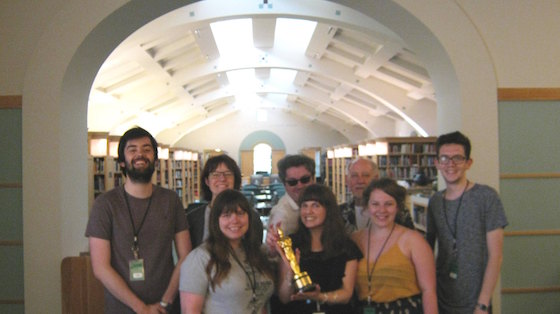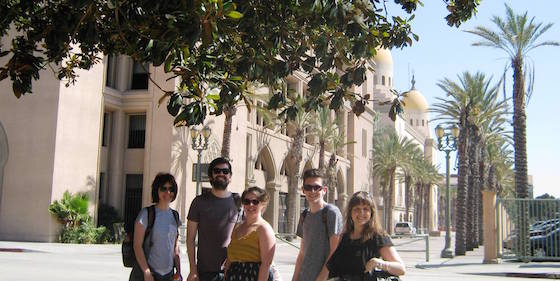Postgraduate researchers are exploring some of the world’s largest film archives in Los Angeles this week.
Six postgraduate students from De Montfort University Leicester (DMU)’s Cinema and Television History (CATH) Research Centre and the Drama Research Group will spend 12 days delving in the archives devoted to film studios, actors and performers.

It is the first ever #DMUglobal trip for postgraduate researchers, and could pave the way for more research-intensive overseas experiences.
They will be at the Margaret Herrick Library, home to the official Academy Awards archive and repository for a wealth of material about legendary stars, the Getty Archive, Warner Bros. Archive and the ONE Archive.
For Kieran Foster, who is researching Hammer’s unmade films, the visit has given him the chance to see how the iconic British studio was regarded by Warner Bros. Both studies were in negotiations to make films together in the 1970s.
Speaking before he left, Kieran said: “I’ve seen things from Hammer’s side because DMU is home to the Hammer Horror Archive but it will be interesting to read things from their point of view.

“I’ve a list as long as my arm of materials I want to see, goodness knows how many boxes I’ve requested! There’s some really interesting material about censorship and America, because one of the key reasons Hammer films were not made was the censor, so that’s an important part of my thesis. It will be a fascinating insight into those films and a point of comparison between the UK and the US.
“We will be immersed in our subject, purely because of the nature of where we are. Even the things we are planning to do in our leisure time are film orientated – seeing the Hollywood sign, going to a rooftop cinema, and the like.”
Kieran also plans to see whether an early Hammer plan for a film about Vlad the Impaler could have influenced Francis Ford Coppola’s Dracula film.
Fellow postgraduate student Kieran Sellars, studying live art and masculinity, will be visiting the Getty Archive to view its records of photographer Robert Mapplethorpe. He will also get to examine the work of performance artists Bob Flanagan and Sheree Rose in the ONE National Gay & Lesbian Archives at the Southern California Libraries.
Some of the work he will be examining no one has been through. “Some of the archive material has never been processed – no one knows what is there. It’s so exciting – I don’t know what to expect. Going with other students means that we have the chance to talk about what we’ve been up to every day, what we’ve found, and share those moments.”
For trip leader Dr Alissa Clarke, Senior Lecturer in Drama and Co-Curator of the Peter Whitehead Archive, it is a chance to further her work on women working as performers in the “Classic Hollywood” era. She plans to dig into the Mae West archives and study documents written by Olivia de Havilland.
She said: “There’s a real lack of writing about this. I’m approaching it from a drama perspective so I’m looking at what they are drawing on, this unacknowledged skill. It’s often described as just being ‘talent’ but there’s more to it than that.
“Both Mae West and Olivia de Havilland were strong women who wanted to control their careers and you can see that in how they approach their work, you can see them become more driven performers.”
The other students on the visit are Robert Chilcott, practice-based researcher; Jennie Voss, who is studying actresses transitioning from silent to sound; Cassie Brummitt, who is writing on Harry Potter, and Becky Jones, whose work examines female AI in films.
RELATED NEWS:*
Find out more about the Cinema and Television History research centre*
Led Zeppelin meets folk rock as researchers open Whitehead Archive at Royal Albert Hall *
Passion for Indian cinema brings communities together in LeicesterJennie is
keeping a blog about the trip. So far, she has read letters from Clara Bow – Hollywood’s ‘It’ girl famously thought to have failed a ‘talkie test’ but in reality was struggling with confidence and mental health issues, and read how Lilian Gish’s stage training helped her prepare for the coming of sound in films.
Dr Clarke said the skills developed on this research trip would be hugely beneficial. She said: “Students will be developing and hearing archival stories directly from one of the best archives in the world. That sense of sharing and conversations could spark new directions in their work.”
Professor of British Cinema, Steve Chibnall, who is visiting Hollywood for the first time on this trip. said: “LA is a city that is the spiritual home of movie making, so for film students – and film academics – it is perhaps a place of pilgrimage. It’s a city you should see at least once in a lifetime.”
Posted on Tuesday 4 July 2017